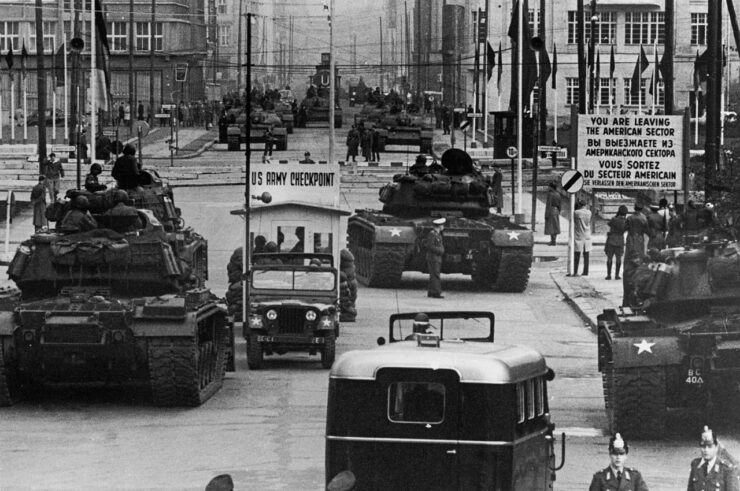Individual humans are ephemeral. But the institutions that people create—religions, philosophies, and most important for this essay, nation-states—may live on. Indeed, there is no reason in principle why a polity could not survive for centuries (the Roman Empire did). Few nations exemplified the potential of the immortal nation-state quite like the Soviet Union.
Free from the chaos and complications of representative democracy, the USSR could direct its economy with an iron fist, under the supervision of powerful leaders. It’s no surprise that a number of science fiction authors foresaw the triumph of the Soviet Union as inevitable (at least until it began crumbling in the mid to late ’80s—a process of disintegration that Mikhail Gorbachev traced to the Chernobyl disaster, which took place 37 years ago this month).
The government of its main rival, the United States, was subject to the whims of mercurial voters. Its only real assets were vast oceanic moats, half a continent’s natural resources, less populous and militarily weak neighbors, the world’s largest economy, a military-industrial establishment that dwarfed every other nation’s (possibly all other nations combined) and an unparalleled entertainment industry that spread their perspective worldwide.
Thus, some observers imagined that historical forces must smile on the Soviets… including the following authors. Herewith, five works about the inevitable triumph of the USSR.
Red Army (1989) by Ralph Peters
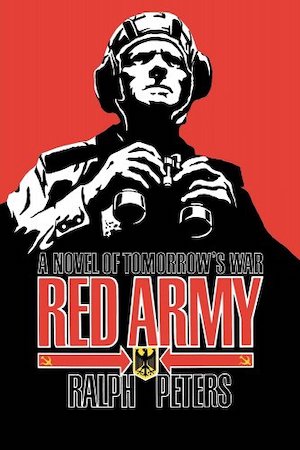
Many Western pundits believed that World War Three would lead inexorably to a catastrophic nuclear exchange. Soviet General Mikhail Malinsky, commander of the First Western Front, and his colleagues don’t agree. NATO’s cumbersome command structure could not possibly react to a sudden decisive conventional attack from the East. Properly conducted, the result would be a short victorious war and a peace dictated on Soviet terms.
History is filled with would-be empire builders who confused ambition with outcome. The Soviets are blessed with a canny understanding of their own abilities. More importantly, they understand their enemy’s weaknesses. The war that follows the Warsaw Pact’s thrust towards the Atlantic is bloody, but the outcome is just as the Reds had hoped: decisive Soviet victory in Europe!
Now the Reds do understand that while they have won the war in Europe, they have not defeated all their enemies. The remaining Western powers will no doubt try to learn from their mistakes and seek revenge on the Soviets. Hijinks will ensue…but not in this novel, which inexplicably never got a sequel.
“A Sleep and a Forgetting” (1979) and “A Thousand Deaths” (1978) by Orson Scott Card
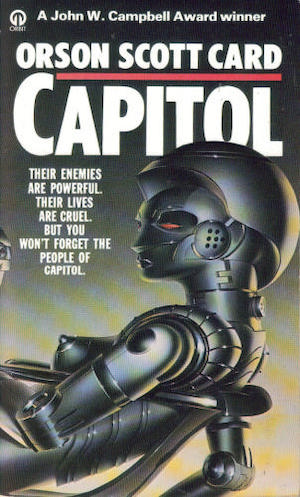
In “A Sleep and a Forgetting” (chronologically the first of these two linked stories), decadent Americans turn a blind eye to the Soviet build-up in Communist Quebec. The Americans pursue other ends and succeed at their limited goals. The Soviets, in contrast, embrace global goals and succeed in crushing the West underfoot.
Having conquered the pitiful US, the Soviets allow Americans to pursue their capitalist follies, believing this will distract them from politics. Occasional dissidents are arrested and made to confess their errors. The very tiny minority who yet resist are dispatched to the worlds of other stars! Everyone wins! At least, every Politburo member wins.
You’d think the US would have learned from the whole Cuban thing not to let Russians stockpile military resources in the US backyard. It is also a bit weird that the Quebec nationalists, many of whom historically viewed the US very favourably, would ally with the Soviets. No doubt mistakes were made…
“Peace With Honor” (1971) by Jerry Pournelle
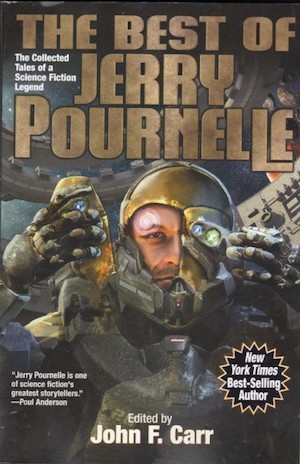
The United States and the Soviet Union could have fought it out. No doubt it would not have taken too long for the survivors to have rediscovered fire and the pointed stick. Choosing survival and power over ideological purity, the two great nations formed the CoDominium and became de facto rulers of Earth.
There were many flaws in the arrangement. America’s Unity Party embraced increasingly corrupt methods to stay in (nominally) elected office lest their nationalist political rivals drag the world into World War Three. With the Soviets struggling with their own war hawks, it is clear that the CoDominium can only delay the final war, not prevent it.
There is, I think, a direct line from this book’s well-meaning political extremists WHO WILL DOOM US ALL and distant sequel The Mote in God’s Eye’s alien Crazy Eddies, who provide their species with similarly catastrophic outcomes.
Generally speaking, SF’s world states tend to be extremely stable, something I suspect would not be the case. It’s nice to have a counter-example. Readers concerned for the fate of the human species here should take comfort that interstellar travel turned out to be surprisingly easy. Humanity’s eggs were not all in one basket.
They Shall Have Stars (1956) and A Life for the Stars (1962) by James Blish
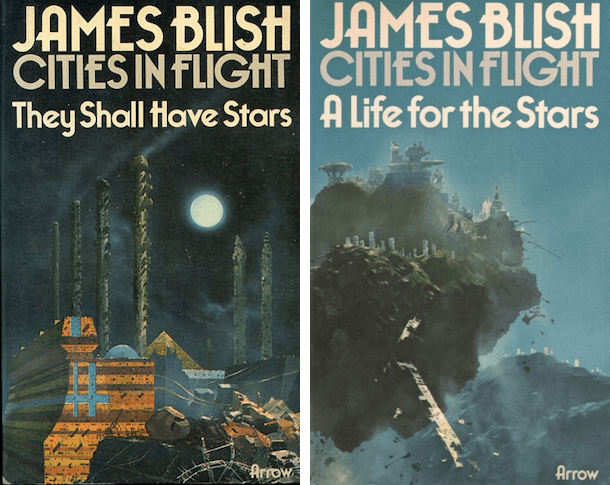
Defending America from the Soviets forced America to become a security state. Everyone is watched and anyone with sufficiently powerful enemies can be declared an enemy of the state and liquidated. Sacrifices must be made! Particularly by the weak and disenfranchised.
By the time inexorable historical processes finished grinding away, the US and the Soviets have evolved into nearly identical bureaucratic states. The Soviets having more practice, they out-administered the US. It was simple logic that they take over the administration of the Earth as a whole. Cue centuries of Soviet-style stagnation and decline.
This has a happy ending of sorts: before the US completely eliminated freedom and progress, it developed at great expense a faster-than-light drive. Thus, escape from the bureaucratic state was possible. Just how powerful was that FTL drive? The series to which these two books belong is known collectively as Cities in Flight.
The Steel, the Mist, and the Blazing Sun (1980) by Christopher Anvil
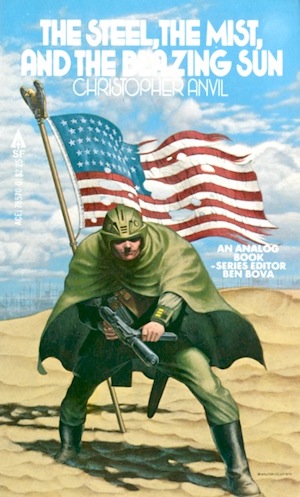
Global crises ended with a radiation-soaked American West and a few Russian colonies in what had been American territory. While detailed knowledge of the past was lost in the great calamity, Arakal, King of the Wesdem O’Cracys and his allies still remember when America was one nation. As far as they are concerned, the present state of affairs is a passing inconvenience. Poor deluded barbarians!
America’s Russian conquerors have superior technology. They have an industrial base the O’Cracys cannot match. Their heartland was not scoured with nuclear fire. They possess a history the barbarians have lost. In all material ways that matter, they dominate. The current trend (O’Cracy winning victory after victory) is disquieting, but any sensible person would know that Russia holds the winning cards.
I regret to report that all the military, political, and industrial resources in the world cannot match the might of a hostile author—matters do not work out quite as sunnily for the Russians as they might hope. Nevertheless, it’s safe to say that the Cold War worked out better for them than the US in this fictional future, at least until shortly before the novel began.
***
Eventual Soviet victory being the inevitability that it was in an alternate timeline, these five works are a very small sample of a very large subgenre. Some readers may have favourites I overlooked. Please feel free to mention them in comments, which are, as ever, below.
In the words of fanfiction author Musty181, four-time Hugo finalist, prolific book reviewer, and perennial Darwin Award nominee James Davis Nicoll “looks like a default mii with glasses.” His work has appeared in Interzone, Publishers Weekly and Romantic Times as well as on his own websites, James Nicoll Reviews (where he is assisted by editor Karen Lofstrom and web person Adrienne L. Travis) and the 2021 and 2022 Aurora Award finalist Young People Read Old SFF (where he is assisted by web person Adrienne L. Travis). His Patreon can be found here.










